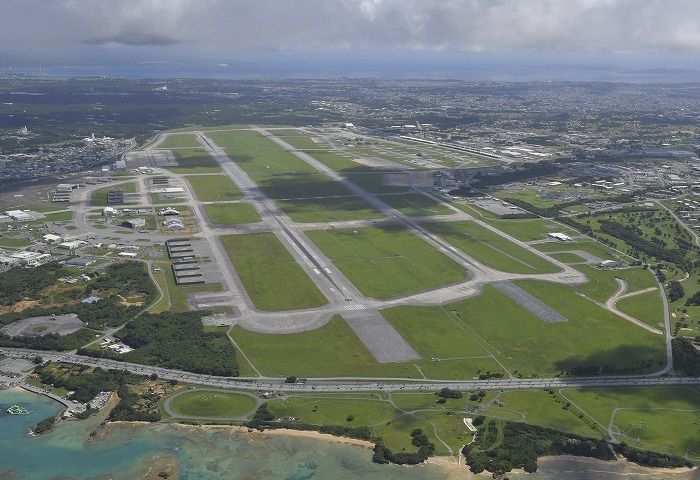Number of plaintiffs in fourth Kadena noise lawsuit exceeds 30,000

October 14, 2021 Ryukyu Shimpo
By Wakana Arakaki
Residents of the areas surrounding Kadena Air Base are pursuing a Kadena noise lawsuit through which they are addressing damage caused by noise from U.S. military aircraft and are requesting, among other things, a ban on flights in the late night and early morning. News coverage about the plaintiffs’ preparatory conference on October 13 revealed that there are over 30,000 plaintiffs for this fourth sequential Kadena noise lawsuit who are making their preparations. The number of plaintiffs has increased since the third such lawsuit when the plaintiffs numbered about 22,000, becoming the largest domestic class-action lawsuit to date. The plaintiff group is accepting more participants until the end of the month, and these participants plan to come together at the end of January next year to present their case.
The plaintiffs are from five municipalities neighboring Kadena Air Base, these being Kadena Town, Chatan Town, Okinawa City, Uruma City, and Yomitan Village. These plaintiffs are residents who live in areas having a noisiness index (W value) of 75 or greater on a noise contour (distribution map) provided by the Japanese government. There is a tendency among younger generations to join the plaintiffs, and it appears a contributing factor to this may be their high level of familiarity with the movement. The fourth lawsuit will request, as did the third lawsuit, a ban on flights of US military aircraft in the late night and early morning, damages for past and future mental distress and the like caused by the noise, and more.
In the third lawsuit, the decision of the Naha branch of the Fukuoka High Court recognized the noise damage caused in the past, and ordered the Japanese government to pay a total sum of 261 billion yen to 22,020 people. The court set aside the matter of a flight ban given that, according to the “third party act theory”, the court is not in a position where it can regulate US military bases.
Shusei Arakawa, 84, a leader of the plaintiffs group in the third lawsuit and the head of the plaintiffs’ preparatory conference, said that “Even 76 years after the war I am forced to hear the roar [of aircraft], and the anger is spreading throughout my day-to-day life. For about 40 years the number of people involved with the movement has been growing”.
The first Kadena noise lawsuit took place in 1982, the second took place in 2000, and the third took place in 2011.
(English translation by T&CT and Erin Jones)
Previous Article:Sachiko Nakada wins best actress at Japanese film festival in the U.S., while her film NANKURUNAISA wins best comedy
Next Article:Memorial service held at Naguyake Monument on the 77th anniversary of the October 10 air raid that burned down 90% of Naha
[Similar Articles]
- One in two Kadena residents are plaintiffs in the fourth Kadena noise lawsuit
- Lawsuit against Kadena Base
- Third Futenma noise lawsuit plaintiffs total 5,846 with 508 newcomers to file additional actions
- Editorial: Salvaging of citizens’ rights to be addressed, at last, in fourth Kadena noise lawsuit
- Japanese court dismisses Kadena noise suit against U.S., citing lack of jurisdiction
 Webcam(Kokusai Street)
Webcam(Kokusai Street)


